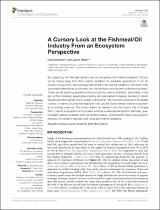| dc.contributor.author | Shannon, Lynne | |
| dc.contributor.author | Waller, Lauren | |
| dc.date.accessioned | 2022-06-09T10:18:57Z | |
| dc.date.available | 2022-06-09T10:18:57Z | |
| dc.date.issued | 2021 | |
| dc.identifier.citation | Shannon, L., & Waller, L. (2021). A cursory look at the fishmeal/oil industry from an ecosystem perspective. Frontiers in Ecology and Evolution, 9, 645023. 10.3389/fevo.2021.645023 | en_US |
| dc.identifier.issn | 2296-701X | |
| dc.identifier.uri | https://doi.org/10.3389/fevo.2021.645023 | |
| dc.identifier.uri | http://hdl.handle.net/10566/7505 | |
| dc.description.abstract | By supporting the fishmeal industry, are we competing with marine predators? Should
we be taking away food from marine predators to subsidize agriculture? If not for
human consumption, should forage fish be left in the sea for predators? Are there more
sustainable alternatives to fishmeal; can the fishing industry be part of developing these?
These are all pressing questions being posed by marine scientists, particularly in the
light of the increasing aquaculture industry and associated increasing demand in recent
decades for fishmeal and oil to sustain cultured fish. We concisely summarize the global
context of marine sourced fishmeal and then use the South African marine ecosystem
as a working example. This article draws on research into the trophic role of forage
fish in marine ecosystems and ponders whether a reduced demand for fishmeal, given
increasing global pressures such as climate change, could benefit marine ecosystems,
fisheries on predatory species, and vulnerable marine predators. | en_US |
| dc.language.iso | en | en_US |
| dc.publisher | Frontiers Media | en_US |
| dc.subject | Fishmeal | en_US |
| dc.subject | Ecosystem | en_US |
| dc.subject | Forage fish | en_US |
| dc.subject | Anchovy | en_US |
| dc.subject | South Africa | en_US |
| dc.title | A cursory look at the fishmeal/oil industry from an ecosystem perspective | en_US |
| dc.type | Article | en_US |

